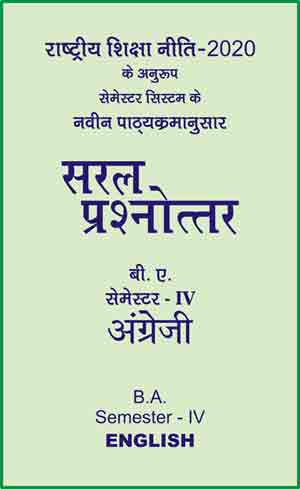|
बी ए - एम ए >> बीए सेमेस्टर-4 अंग्रेजी बीए सेमेस्टर-4 अंग्रेजीसरल प्रश्नोत्तर समूह
|
5 पाठक हैं |
|||||||
बीए सेमेस्टर-4 अंग्रेजी - सरल प्रश्नोत्तर
Objective Type Questions
For each of the following questions, four alternatives are given for the answer. Only one of them is correct. Choose the correct alternative.
1. Literal translation is.......
(a) word by word translation
(b) free translation
(c) adaptation
(d) none of them.
2. Other name of free translation is ......
(a) Adaptation
(b) Similar
(c) Opposite
(d) None of these.
3. Free translation is often used for ...
(a) poetry, drama, advertising
(b) grammar
(c) word by word translation
(d) none of them.
4. A.........is one that maintains the original content changing structure form or style.
(a) Literal translation
(b) Verse translation
(c) Metrical translation
(d)Rhymed translation
5. Which translation is also called direct translation:
(a) free translation
(b) literal translation
(c) word translation
(d) grammar translation
6. The way of translation social or cultural reality of text to that of the culture of target language is:
(a) adaptation
(b) linguistic
(c) calque
(d) untranslatability
7. ......is translation on author word by word and line to line fromone language to another.
(a) metaphase
(b) imitation
(c) mistranslation
(d) vertical
8. .....is the process of can verting an original or source into a text in another language.
(a) etymology
(b) translation
(c) phonetics
(d) linguistics.
9. A...... is one that maintains the original context of changing the structure for or style:
(a) literal translation
(b) blank verse translation
(c) rhymed translation
(d) metrical translation.
10..In which translator keeps putting the synonym sentence of each word of the text into the target language.
(a) literal translation
(b) rhymed translation
(c) blank verse translation
(d) metrical translation.
11.... ... is translating a work word by word and line by line from one language to another.
(a) metaphase
(b) literal translation
(c) metrical translation
(d) free translation
12. ......... refers to the technical translation of scientific technical, or legal texts.
(a) free translation
(b) blank verse translation
(c) literal translation
(d) metrical translation
13. The term translation, often appears in the title of.........century.
(a) 17th
(b) 18th
(c) 19th
(d) 20th
14. Literal translation also known as:
(a) direct translation
(b) word-to-word translation
(c) both 'a' and 'b'
(d) creative translation.
15. This translation reproduce the general meaning of the original text:
(a) feantice
(b) literal
(c) sem
(d) idiomatic
16. Which translation involving legal, technical, or Scientific texts
(a) literally
(b) semantic
(c) free
17. Involves word-to-Word Translation:
(a) semantic translation
(b) faithful translation
(c) literal
(d) idiomatic translation
18. Ideal for literary translation:
(a) literal translation
(b) free translation
(c) semantic translation
(d) none of the above.
19. In translation theory, another term for 'literal translation' is:
(a) metaphrase
(b) paraphase
(c) idioms
(d) analogous
20. free translation is also known as:
(a) direct translation
(b) non literary translation
(c) creative translation
(d) idiomatic translation
21. Direct Translation is also known as:
(a) Literal translation
(b) Creative translation
(c) Free translation
(d) All of these
22. Translators usually make suchalterations to keep the content and language........
(a) Technical and legal
(b) Rhymeful and attractive
(c) Fluent and natural
(d) All of them
23. Word by word translation is called -
(a) Adaptation
(b) Similar
(c) Literate translation
(d) All of them
24. Free translations are ideal for
(a) Legal translations
(b) Technical sources
(c) Literary translations
(d) None of these
25. Literal translation leads to mistranslation of .....
(a) Antonyms
(b) Idioms
(c) Synonyms
(d) One word
26. What is the nature of literal translation?
(a) Easy
(b) Accurate and quick
(c) Very fast
(d) None of these
27. Lack of fidelity of the text in SL can be defined as in translation studies.
(a) Distortion
(b) Semantic
(c) Syntactic
(d) Spirit
28. Traditionally who was considered inferior to the author?
(a) Translator
(b) Narrator
(c) Poet
(d) Writer
29. In ......... the translator uses the word or phrase of the original, usually in italics.
(a) Cultural
(b) Borrowing
(c) Paraphrase
(d) Calque
30. The problems of equivalence arises primarily in translating -
(a) Idioms
(b) Plays
(c) Fiction
(d) Poems
31. Machine translation can use as a method which is based on entries.
(a) Books
(b) Journal
(c) Dictionary
(d) Article
32. Literal translation also have a role in the creation of....
(a) Latin language
(b) Pidgin language
(c) Sanskrit language
(d) None of these
33. The translation should preserve for the original expression of the
(a) Sounds
(b) Language
(c) Literature
(d) Work
34. Semantic translation differs from -
(a) Free translation
(b) Faithful translation
(c) Useful translation
(d) Literal translation
35."Word to word" meaning is - (a) To look for Midday at 1 P.M. (b) To look for Midday at 3 P.M.
(c) To look for Midday at 2 P.M.
(d) To look for Night at 2 A.M.
36. The translated texts were
(a) Legal and valid
(b) Legal and religious
(c) Compared and legal
(d) None of these
37. Literary texts can be recognized as literary and ..... forms.
(a) Compare
(b) Logistics
(c) Artistic
(d) None of these
38. Translated text is
(a) High
(b) Low
(c) Middle
(d) Very high
39. Translation makes us experience different cultures and norms through
(a) Language
(b) Literature
(c) Text
(d) Stories
40. Translation of literary text allows it to travel across-
(a) Nations
(b) Boundaries
(c) Both (a) and (b)
(d) None of these
41. Who did write 'Midnight Children'?
(a) George
(b) A. P. J Abdul Kalam
(c) Salman Rushdie
(d) Jane Austen
|
|||||














